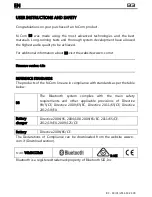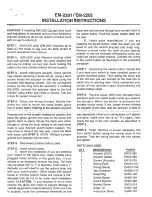
2. If a child from 2 to 12 years old (not in a
rear-facing child restraint) must ride in the
front passenger seat, move the seat as far
back as possible and use the proper child
restraint (refer to “Child Restraints” in this
section for further information).
3. Children that are not big enough to wear the
vehicle seat belt properly (refer to “Child
Restraints” in this section for further informa-
tion) should be secured in a vehicle with a
rear seat in child restraints or belt-positioning
booster seats. Older children who do not use
child restraints or belt-positioning booster
seats should ride properly buckled up in a
vehicle with a rear seat.
4. Never allow children to slide the shoulder
belt behind them or under their arm.
5. You should read the instructions provided
with your child restraint to make sure that you
are using it properly.
6. All occupants should always wear their lap
and shoulder belts properly.
7. The driver and front passenger seats should
be moved back as far as practical to allow
the front air bags room to inflate.
8. Do not lean against the door or window. If
your vehicle has side air bags, and deploy-
ment occurs, the side air bags will inflate
forcefully into the space between occupants
and the door and occupants could be injured.
9. If the air bag system in this vehicle needs to
be modified to accommodate a disabled per-
son, refer to the “If You Need Consumer
Assistance” section for customer service
contact information.
WARNING!
•
NEVER use a rearward facing child re-
straint on a seat protected by an ACTIVE
AIRBAG in front of it, DEATH or SERIOUS
INJURY to the CHILD can occur.
•
Only use a rear-facing child restraint in a
vehicle with a rear seat.
(Continued)
WARNING! (Continued)
•
A deploying passenger front air bag can
cause death or serious injury to a child
12 years or younger, including a child in a
rear-facing child restraint.
Seat Belt Systems
Buckle up even though you are an excellent
driver, even on short trips. Someone on the road
may be a poor driver and could cause a collision
that includes you. This can happen far away
from home or on your own street.
Research has shown that seat belts save lives,
and they can reduce the seriousness of injuries
in a collision. Some of the worst injuries happen
when people are thrown from the vehicle. Seat
belts reduce the possibility of ejection and the
risk of injury caused by striking the inside of the
vehicle. Everyone in a motor vehicle should be
belted at all times.
Enhanced Seat Belt Use Reminder System
(BeltAlert)
Driver
And
Passenger
BeltAlert
—
If
Equipped
BeltAlert is a feature intended to remind the
driver and outboard front seat passenger (if
equipped with outboard front passenger seat
BeltAlert) to buckle their seat belts. The Belt
Alert feature is active whenever the ignition
switch is in the START or ON/RUN position.
Warning Label On Front Passenger Sun Visor
17
Summary of Contents for Viper 2017
Page 2: ......
Page 3: ......
Page 5: ...2...
Page 45: ...42...
Page 100: ...Overview 8 4 NAV Temperature Controls 97...
Page 107: ...Operating Tips Chart 104...
Page 113: ...110...
Page 180: ...8 MAINTENANCE SCHEDULES MAINTENANCE SCHEDULE 178 177...
Page 181: ...MAINTENANCE SCHEDULE Refer to the Service And Warranty Handbook for maintenance schedules 178...
Page 182: ...9 IF YOU NEED CONSUMER ASSISTANCE IF YOU NEED ASSISTANCE 180 179...
Page 184: ...181...
Page 185: ...182...
Page 186: ...10 INDEX 183...
Page 200: ...8...
Page 201: ......
Page 202: ......
Page 204: ...7 9 9 B 9 B...
Page 205: ...I B I...
Page 206: ......
Page 207: ......
Page 234: ...8 4 1 5 0 6 O v T Ry 2 E H O 7 E H 3 R 5 I2 8 R 2 4 2 9 5 O RO eI2 eR 5...
Page 247: ......
Page 282: ...X...
Page 384: ...F G H J 8 L H 9 M 9 G...
Page 385: ......
Page 386: ...2 3 4 5 67 8 9 7 9 9 B 8...
Page 387: ......
Page 388: ......
Page 389: ...Viper 1 7 Z D 1 2 6 A R A A A...
















































